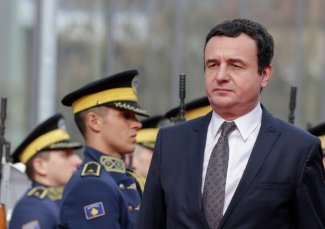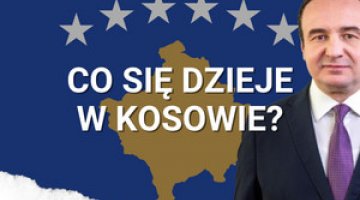Kosovo: a protest movement comes to power

On 3 February the Kosovo parliament approved the formation of a government under Albin Kurti, the leader of the anti-establishment Vetëvendosje (VV, Self-Determination) party, which will form a coalition with the centrist Democratic League of Kosovo (LDK). The government will also include representatives of the national minorities, including Serbs. The previous ruling parties boycotted the vote. The number of ministries has been reduced from 21 to 15: VV and the LDK took six ministerial posts each, and the other three went to the national minorities’ representatives. The new government’s priority is to implement economic reforms and continue the process of EU integration.
The overwhelming win for VV and the LDK (which together received more than 50% of the vote) in the parliamentary elections of 6 October 2019 is a reflection of the public’s support for radical reforms and their dissatisfaction with the long-standing rule of those groups whose roots lie in the Kosovo Liberation Army (KLA) – the Democratic Party of Kosovo (PDK), the Alliance for the Future of Kosovo (AAK) and the Initiative for Kosovo (NISMA) – which have dominated the political scene since Kosovo gained independence. A younger generation of politicians and experts will fill key positions in the government, and a focus on socio-economic issues has been announced; these moves are an important innovation on Kosovo’s political scene. At the same time, the long negotiations between the VV and the LDK over who would take which cabinet positions indicate that both parties have diverging objectives which could threaten the cohesion of the government. The public expectations of the new government are very great, but given the scale of the challenges arising from the socio-economic situation, the reform process will be long and complex. The first few months will show whether the government is determined enough to take advantage of its strong public mandate to implement the radical solutions which will strike at the interests of the current political class. EU and US policy towards the region will also significantly affect its operations; if these actors push for a rapid normalisation of relations between Kosovo and Serbia, this would significantly impede the implementation of internal reforms.
Vetëvendosje: from a protest movement to the main political force
The Vetëvendosje group, founded in 2010, has its roots in the protest movement against the actions of the Western countries and the missions run by the UN (UNMIK) and the EU (EULEX, set up in 2008 after Prishtina declared independence) in Kosovo. VV held them responsible for supporting politicians accused of corruption and war crimes; it also opposed the negotiations with Serbia which have been conducted under EU auspices since 2011, arguing that they are not fair and balanced. VV’s radical demands led Western representatives to put pressure on the other parties in Kosovo to isolate it and prevent it from taking power. In the late nineties, Kurti himself led pro-independence protests by students, and in 1999 a Serbian court sentenced him to 15 years in prison (although he was released in 2001 after the collapse of the Milošević regime).
VV’s gradual increase in support has been due to growing discontent among the public in Kosovo with the corrupt ruling elites, who have been accused of making unfavourable agreements with Serbia (under pressure from the West), in exchange for easing off on prosecuting politicians suspected of war crimes and corruption. At the same time, successive governments of Kosovo have attached little importance to strengthening state institutions and boosting economic development, while tolerating corruption and organised crime. VV also owes its electoral success to its focus on socio-economic issues, which is important for Kosovo’s young population (where the average age is 29). Moreover, VV’s demand for deeper EU integration while defending the state’s interests in the international arena is in line with the Kosovars’ expectations, especially in the context of relations with Serbia. Support for the EU and the US is high, but their influence on political processes in Kosovo has come in for criticism. VV has withdrawn from its direct criticism of Western policy and the most radical slogans and methods of political struggle (such as blocking the work of parliament by letting off tear gas); this means that the party has now become more acceptable to foreign partners.
The challenges for the new government
The main challenge for the new cabinet will be to improve the difficult socio-economic situation, whose symptoms include high levels of unemployment (31%) and emigration (since 2014 over 200,000 citizens – out of a country of almost two million – have requested asylum in EU countries). Although in recent years Kosovo has recorded a good rate of economic growth (an annual average of c. 4% of GDP), it is still one of the poorest EU-candidate countries. The way in which the cabinet posts have been assigned to the coalition partners indicates that VV’s priorities will be economic issues and health care reform, education and justice. The prime minister has announced measures to change the structure of the economy (currently 15% of GDP is made up of remittances from Kosovars abroad) by creating a Development Fund and increasing the availability of loans and support for small- and medium-sized enterprises. The government has also said that will focus on the fight against corruption and organised crime, what includ the vetting of judges. Both the President of Kosovo, Hashim Thaçi (formerly of the PDK; his term ends in 2021) and the opposition (through their influence over the politicised state apparatus) will try to block any anti-corruption moves which threaten the politicians of those parties.
Kurti has also promised to work closely with Albania, but relations between the two countries could be very difficult. The weakness of successive governments in Kosovo gave Albania’s prime minister Edi Rama the ambition to act as the representative of the whole Albanian population in the Balkans. The popularity of a charismatic leader like Kurti could scupper these plans, the more so as Kurti’s anti-corruption agenda also has many supporters in Albania itself (VV has its own representation in the country), and could weaken the position of Rami, who has been accused of corruption.
A difficult partner
VV’s reform efforts, particularly in the fight against corruption, could also be hampered by its coalition partner, the LDK. Although the party has echoed VV’s anti-corruption slogans in recent years, it was in a government coalition together with the PDK in the years 2008-10 and 2014-17. It owes its success in this election to the prominence during the campaign of young, Western-educated politicians, primarily the lawyer Vjosa Osmani, who headed the LDK’s electoral list. Some of the LDK’s most influential politicians (including the former Prime Minister Isa Mustafa) did not even run in the elections, but the course of the coalition negotiations indicates that the older generation of politicians still plays the main role in the party (Osmani has not received even a position in the government; she will become the speaker of parliament). During the coalition negotiations, Mustafa was most anxious to obtain a promise of support for his run for president in 2021 (the parliament chooses the president in Kosovo) and to win as many ministries as possible for his party, particularly the Interior Ministry. Ultimately there was no agreement on a joint candidate for president, but VV had to withdraw from its election promise to reduce the total number of ministries to 12. The LDK did also gain control of the Interior Ministry, which gives it the tools to inhibit any investigations against its own politicians. Cooperation within the ruling coalition and the success of the current government will depend on whether the LDK’s younger politicians succeed in limiting the influence of the older generation.
Little chance of compromise with Serbs
One of the new government’s main challenges will be the relationship with the Serbian minority and normalising relations with Serbia. Although this issue is crucial for strengthening Kosovo’s international position, it played only a marginal role in the election campaign, and it is not a priority for the present government. Since the beginning VV was opposed to negotiations with Serbia or to making any concessions to the representatives of the Serb minority (which makes up around 7% of the population). Their reasons for this approach included the belief that the Serbian List (the party representing the Serbian minority in parliament, but which in reality serves the interests of Belgrade) has been taking advantage of its prerogatives to sabotage the Kosovo government’s efforts. At present, Kurti is in favour of continuing talks with Serbia; also, despite his initial declarations, he has included representatives of the Serbian List in his cabinet (they have two seats). The prime minister has even declared his desire to repeal the previous government-imposed 100% duties on products from Serbia, which would allow the EU-led negotiations between Kosovo and Serbia to resume.
The new prime minister will be more assertive towards Belgrade than President Thaçi, whose position in the negotiations was weakened by accusations that he committed war crimes and his lack of support from the public. Serbia is also in no hurry to reach an agreement, as it uses the issue of Kosovo as a bargaining chip in its relations with the EU. Relations between Belgrade and Prishtina will largely depend on pressure from the Western states, and over the past few years they have been unable to reach a common position on the issue. The US, which wants a rapid resolution to the dispute, has pushed the concept of a land-swap (the north of Kosovo, largely inhabited by Serbs, could be exchanged for an Albanian-dominated area in Serbia). However, this idea has been flatly rejected by Germany, which is opposed to any adjustments to the borders in Europe, and prefers negotiations on technical issues – which it assumes would take many years. In order to push forward US policy in the region, President Donald Trump appointed Richard Grenell, hitherto the US ambassador to Germany, as the United States’ special envoy to the Belgrade-Prishtina dialogue. In January this year he managed to bring about the first Serbia-Kosovo agreement since 2015, which paves the way for the restoration of direct flights between the two countries. Germany has also taken action to strengthen its influence over the process; according to media reports, the German diplomat Christoph Heusgen will become the EU’s special representative to the Serbia-Kosovo dialogue.
VV is currently the only political force that offers the hope of building efficient institutions and effectively combatting corruption in Kosovo. Given the scale of the challenges, its difficult coalition partner and the unpredictable international environment, this would seem to be a very difficult task. If the West insists on rapid progress in the negotiations with Serbia, which would make it difficult for the new government to focus on internal reforms, it will become significantly less likely that radical changes will be carried out.




